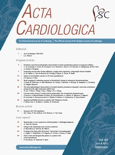
ACTA CARDIOLOGICA
Scope & Guideline
Elevating standards in cardiovascular health research.
Introduction
Aims and Scopes
- Cardiovascular Disease Management:
The journal publishes studies focused on the management of cardiovascular diseases, including heart failure, coronary artery disease, and arrhythmias, providing insights into clinical practices and therapeutic strategies. - Innovative Diagnostic Techniques:
Research highlighting advancements in diagnostic methodologies such as echocardiography, cardiac MRI, and CT imaging, which enhance the detection and understanding of cardiovascular conditions. - Cardio-Oncology:
A growing area of focus, addressing the intersection of oncology and cardiology, including the effects of cancer therapies on cardiovascular health. - Cardiac Imaging:
Studies that explore novel imaging techniques and their implications for diagnosing and monitoring heart diseases, including the integration of 3D imaging and AI technologies. - Epidemiological Studies:
Research that investigates the prevalence, risk factors, and outcomes of various cardiovascular conditions across different populations, contributing to public health knowledge. - Transcatheter Interventions:
A significant emphasis on the role of minimally invasive procedures, such as transcatheter aortic valve replacement (TAVR) and other catheter-based interventions. - Heart Failure Research:
Extensive coverage of both acute and chronic heart failure, focusing on pathophysiology, treatment modalities, and patient outcomes. - Risk Assessment and Predictive Models:
The development and validation of scoring systems and biomarkers that predict cardiovascular events and guide clinical decision-making.
Trending and Emerging
- Telemedicine and Remote Monitoring:
The COVID-19 pandemic has accelerated research into telemedicine and remote monitoring of cardiovascular patients, highlighting the importance of accessible healthcare. - Artificial Intelligence in Cardiology:
An increasing number of studies are exploring the application of AI and machine learning in diagnosing and managing cardiovascular diseases, enhancing decision-making. - Heart-Brain Connection:
Research investigating the relationship between cardiovascular health and neurological outcomes, particularly in patients with atrial fibrillation and stroke. - Personalized Medicine Approaches:
There is a growing focus on tailoring cardiovascular treatments to individual patient profiles, including genetic and biomarker assessments. - Cardio-Oncology Research:
The intersection of cardiology and oncology is gaining prominence, addressing the cardiovascular effects of cancer therapies and the management of cancer patients with heart disease. - Impact of Lifestyle Factors:
Emerging studies are emphasizing the role of lifestyle modifications, including diet and exercise, in managing cardiovascular health and preventing disease. - Long COVID and Cardiovascular Implications:
Research is increasingly focused on the cardiovascular effects of COVID-19, particularly in patients recovering from the virus.
Declining or Waning
- Traditional Risk Factors:
Research on established cardiovascular risk factors like cholesterol levels and hypertension has seen a decline, possibly due to a growing interest in novel biomarkers and lifestyle factors. - Open-Heart Surgery Techniques:
As minimally invasive procedures gain popularity, the volume of research dedicated to traditional open-heart surgery techniques appears to be decreasing. - Electrophysiology Techniques:
While still important, the volume of studies focusing on older electrophysiology techniques may be decreasing as newer technologies and methods emerge. - Basic Science Research:
Investigations into basic cardiovascular physiology and pathology seem to be less prevalent, with a shift towards more applied clinical research. - Longitudinal Cohort Studies:
There appears to be a reduction in the number of longitudinal cohort studies as the focus shifts towards more immediate clinical outcomes and interventional studies.
Similar Journals

World Journal of Cardiology
Fostering collaboration and discovery in cardiovascular research.World Journal of Cardiology, published by BAISHIDENG PUBLISHING GROUP INC, stands out as a pivotal resource in the field of cardiology and cardiovascular medicine. With an ISSN of 1949-8462, this journal serves a global audience, promoting knowledge dissemination and collaboration among researchers, healthcare professionals, and students dedicated to advancing cardiovascular health. The journal demonstrates its credibility and impact in the field by achieving a respectable Q2 ranking in the 2023 category of Cardiology and Cardiovascular Medicine. Notably, it is listed in the Scopus database, ranking #189 out of 387 journals, placing it in the 51st percentile, which underscores its relevance and contribution to contemporary cardiovascular research. Although it operates under a subscription model, the journal provides diverse access options, ensuring that critical findings reach a wide audience. Through its comprehensive scope and commitment to publishing high-quality articles, the World Journal of Cardiology plays a vital role in shaping the future of cardiovascular science, making it an invaluable asset for those involved in this essential discipline.

Kardiologie
Pioneering Insights for the Future of Cardiology.Kardiologie is an emerging journal dedicated to advancing the field of cardiology and cardiovascular medicine, published by SPRINGER HEIDELBERG in Germany. Established with the first issue in 2022, this journal provides a valuable platform for the dissemination of innovative research, clinical studies, and review articles that contribute to both theoretical knowledge and practical applications in cardiology. While the journal currently holds a Q4 category ranking in the field and occupies a percentile of 24 according to Scopus, it aims to enhance its impact factor by attracting high-quality submissions from researchers and clinicians alike. Kardiologie is particularly focused on bridging the gap between cutting-edge research and clinical practice, ensuring that the latest scientific findings are readily accessible to practitioners. Though it operates under traditional access options at present, the journal aspires to broaden its accessibility and reach in future editions, making it a pertinent choice for anyone interested in the evolving landscape of cardiovascular health.
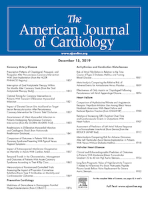
AMERICAN JOURNAL OF CARDIOLOGY
Driving Innovation in Heart Health and Clinical OutcomesThe American Journal of Cardiology is a leading peer-reviewed journal in the field of Cardiology and Cardiovascular Medicine, published by Excerpta Medica Inc-Elsevier Science Inc. Since its inception in 1958, the journal has consistently contributed to the advancement of cardiovascular research, providing a platform for groundbreaking studies and clinical findings that shape modern medical practices. With an impressive impact factor placing it in the Q1 category in its field for 2023, it ranks among the top journals in medicine, with a rank of #155 out of 387 in the Scopus database, reflecting its significance and rigorous editorial standards. The journal is committed to disseminating high-quality research that fosters innovation and enhances clinical outcomes in cardiology. Although it does not provide Open Access options, the American Journal of Cardiology remains an essential resource for researchers, healthcare professionals, and students looking to deepen their understanding of cardiovascular health.
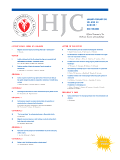
Hellenic Journal of Cardiology
Empowering Heart Health Through Innovative ResearchThe Hellenic Journal of Cardiology, a peer-reviewed open-access publication under the esteemed ELSEVIER banner, proudly represents the forefront of research in the field of Cardiology and Cardiovascular Medicine. Established in 1993 and actively publishing since then, this journal has carved a niche in disseminating high-quality research and clinical insights relevant to cardiovascular health in Greece and beyond. With an impressive Q2 ranking in both Cardiology and Cardiovascular Medicine categories as of 2023, the journal holds a commendable position at Rank #126/387 in Scopus, indicative of its critical role in advancing scientific knowledge and practice. The Hellenic Journal of Cardiology transitioned to open access in 2016, ensuring that ground-breaking research is freely accessible, fostering a global dialogue among researchers, clinicians, and students alike. Its publication frequency spans significant years, providing a continuous flow of innovative findings while addressing pressing cardiovascular issues. As the journal builds on its legacy, it aspires to enrich the academic community's understanding of cardiovascular medicine, making it an invaluable resource for anyone invested in heart health.

JACC-Cardiovascular Imaging
Driving Excellence in Cardiovascular Imaging StudiesJACC-Cardiovascular Imaging, published by Elsevier Science Inc, is a premier journal that focuses on the rapidly evolving field of cardiovascular imaging, providing a vital platform for the dissemination of high-quality research and clinical studies. With an impressive impact factor and ranking within the top tier of cardiology and radiology specialties, the journal is recognized for its commitment to advancing knowledge in diagnostic imaging techniques, including echocardiography, MRI, and CT in cardiovascular contexts. Since its inception in 2008 and converging through 2024, JACC-Cardiovascular Imaging has maintained a distinguished position, currently ranking Q1 both in Cardiology and Cardiovascular Medicine as well as in Radiology, Nuclear Medicine and Imaging. This ensures its relevance and influence, as evidenced by its Scopus rankings—ranked #2 in Radiology and #8 in Cardiology, placing it in the top echelons of scholarly output. Although it does not offer open access, the journal's content is crucial for researchers, clinicians, and students who seek to remain at the forefront of cardiovascular imaging advancements.
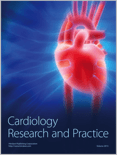
Cardiology Research and Practice
Connecting researchers and practitioners for impactful change.Cardiology Research and Practice is a leading academic journal dedicated to advancing knowledge in the fields of cardiology and cardiovascular medicine. Published by HINDAWI LTD, this journal has been an inclusive platform for open access research since 2009, facilitating the dissemination of high-quality studies that contribute to the global scientific community. With an impact factor placing it in Q2 of its category in 2023, it underscores its importance in delivering innovative insights and discoveries that shape clinical practices and policies. The journal covers a broad scope of topics including, but not limited to, cardiovascular disease prevention, innovative treatment modalities, and emerging technologies, appealing to researchers, healthcare professionals, and students alike. Located in the United States with its international reach, Cardiology Research and Practice serves as a critical resource for those dedicated to improving patient outcomes and advancing the field of cardiology.
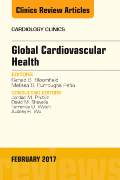
CARDIOLOGY CLINICS
Exploring the forefront of cardiovascular medicine since 1983.CARDIOLOGY CLINICS is a prestigious journal published by W B SAUNDERS CO-ELSEVIER INC, offering insightful and comprehensive reviews in the field of cardiology and cardiovascular medicine since its inception in 1983. With its ISSN 0733-8651 and E-ISSN 1558-2264, the journal has established a significant impact factor within the academic community, holding a Q2 ranking in both Cardiology and Cardiovascular Medicine as well as in Medicine (miscellaneous) for 2023. Located in the heart of Philadelphia, USA, it serves as a vital resource for researchers, clinicians, and students seeking to deepen their understanding of cardiovascular diseases and advancements in treatment. Although it operates under a traditional subscription model, the journal remains committed to disseminating valuable knowledge that shapes current practices and informs future research directions. As it converges towards its 2024 issues, CARDIOLOGY CLINICS continues to play an influential role in enhancing the discourse on cardiovascular health worldwide, ensuring that its audience stays at the forefront of clinical and scientific developments.
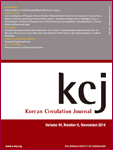
Korean Circulation Journal
Connecting Researchers and Practitioners for Heart Health Advancements.Korean Circulation Journal, published by the Korean Society of Cardiology, has established itself as a prominent platform for disseminating research in the fields of Cardiology and Cardiovascular Medicine. With an ISSN of 1738-5520 and an E-ISSN of 1738-5555, this journal has been at the forefront of cardiovascular science since its inception in 2006 and is projected to continue until 2024. The journal's commitment to quality is reflected in its 2023 category quartiles, ranking in the second quartile (Q2) for both Cardiology and Internal Medicine, as well as its commendable Scopus rankings within the respective fields. Located in South Korea, the journal aims to bridge the gap between cutting-edge research and practical applications, serving as an invaluable resource for researchers, healthcare professionals, and students keen on advancing their understanding of cardiovascular health. Although currently not an open-access journal, it provides a wealth of knowledge that encourages evidence-based practice in clinical settings.

Arquivos Brasileiros de Cardiologia
Empowering researchers to transform cardiology insights into practice.Arquivos Brasileiros de Cardiologia is a leading open-access journal dedicated to advancing the field of cardiology and cardiovascular medicine. Established in 1950 and published by the ARQUIVOS BRASILEIROS CARDIOLOGIA, this Brazilian journal plays a crucial role in disseminating high-quality research that addresses both emerging and established topics in cardiovascular science. With an impressive history and a commitment to open access since 1997, it provides researchers, healthcare professionals, and students with free and readily available content that significantly contributes to the understanding and management of cardiovascular diseases. The journal is indexed in Scopus and holds a Q3 ranking in the category of Cardiology and Cardiovascular Medicine, demonstrating its relevance and participation within the global research community. Researchers can submit their work and access a wealth of information that spans a variety of subfields, reflecting the journal’s dedication to fostering innovation and collaboration within cardiology. With a mailing address at Avenida Marechal Câmara, 160-330 Centro, Rio de Janeiro, RJ 20,020-907, Brazil, the journal continues to serve as a vital platform for scholarly communication and knowledge exchange in the cardiovascular realm.
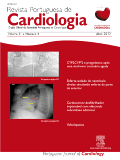
Revista Portuguesa de Cardiologia
Transforming cardiovascular medicine with cutting-edge research.Revista Portuguesa de Cardiologia, published by Elsevier España SLU, stands as a pivotal resource in the realm of Cardiology and Cardiovascular Medicine. With its origins tracing back to 1970, this journal has cultivated a robust academic presence, achieving a 2023 Q3 ranking in its category, and currently holding a position of #220 out of 387 on the Scopus rankings, placing it within the 43rd percentile of its field. This open access journal, available since 2011, aims to disseminate high-quality research and insights relevant to contemporary cardiovascular issues. Its commitment to accessibility and knowledge exchange enhances its importance for clinicians, researchers, and students alike, fostering a more informed community in the fight against cardiovascular diseases. Operating from its base in Barcelona, Spain, the journal welcomes contributions that further the understanding and treatment of heart conditions, contributing significantly to the advancement of cardiovascular health.